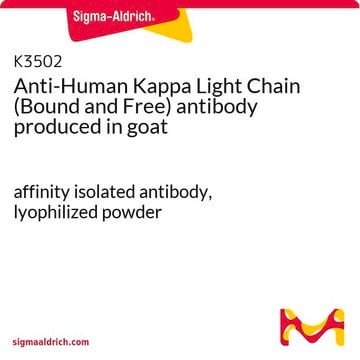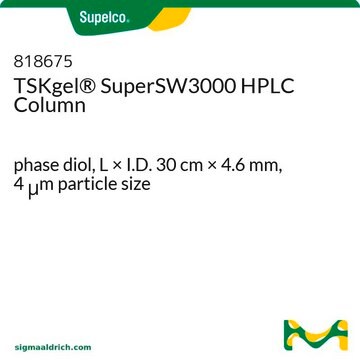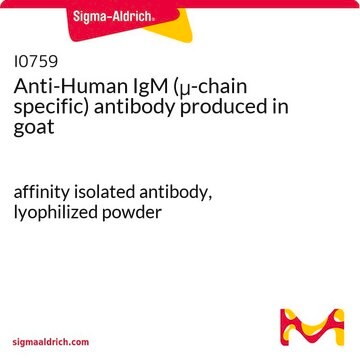A2904
Anti-Human Lambda Light Chains (Bound and Free)−Alkaline Phosphatase antibody produced in goat
affinity isolated antibody, buffered aqueous glycerol solution
Synonym(s):
Goat Anti-Human Lambda Light Chains (Bound and Free)−AP
About This Item
Recommended Products
biological source
goat
Quality Level
conjugate
alkaline phosphatase conjugate
antibody form
affinity isolated antibody
antibody product type
secondary antibodies
clone
polyclonal
form
buffered aqueous glycerol solution
species reactivity
human
technique(s)
direct ELISA: 1:2,000-1:21,000
shipped in
wet ice
storage temp.
2-8°C
target post-translational modification
unmodified
General description
Alkaline Phosphatase is an enzyme that catalyzes the conversion of chromogenic substrates such as p-nitrophenylphosphate (PNPP); chemiluminescent substrates such as CDP-Star® and fluorogenic substrates such as 4-methylumbelliferyl phosphate (4-MUP) into detectable chromophores, light-emitters or fluorescers, respectively.
Immunogen
Application
Physical form
Legal Information
Disclaimer
Not finding the right product?
Try our Product Selector Tool.
Storage Class Code
10 - Combustible liquids
WGK
WGK 2
Flash Point(F)
Not applicable
Flash Point(C)
Not applicable
Certificates of Analysis (COA)
Search for Certificates of Analysis (COA) by entering the products Lot/Batch Number. Lot and Batch Numbers can be found on a product’s label following the words ‘Lot’ or ‘Batch’.
Already Own This Product?
Find documentation for the products that you have recently purchased in the Document Library.
Our team of scientists has experience in all areas of research including Life Science, Material Science, Chemical Synthesis, Chromatography, Analytical and many others.
Contact Technical Service







